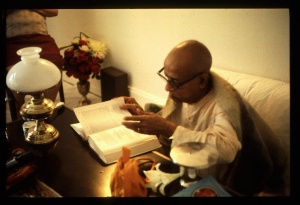CC Madhya 20.127 (1975): Difference between revisions
(Vanibot #0027: CCMirror - Mirror CC's 1996 edition to form a basis for 1975) |
(Vanibot #0020: VersionCompareLinker - added a link to the Version Compare feature) |
||
| Line 2: | Line 2: | ||
<div style="float:left">'''[[Sri Caitanya-caritamrta (1975)|Śrī Caitanya-caritāmṛta (1975)]] - [[CC Madhya (1975)|Madhya-līlā]] - [[CC Madhya 20 (1975)|Chapter 20: Lord Śrī Caitanya Mahāprabhu Instructs Sanātana Gosvāmī in the Science of the Absolute Truth]]'''</div> | <div style="float:left">'''[[Sri Caitanya-caritamrta (1975)|Śrī Caitanya-caritāmṛta (1975)]] - [[CC Madhya (1975)|Madhya-līlā]] - [[CC Madhya 20 (1975)|Chapter 20: Lord Śrī Caitanya Mahāprabhu Instructs Sanātana Gosvāmī in the Science of the Absolute Truth]]'''</div> | ||
<div style="float:right">[[File:Go-previous.png|link=CC Madhya 20.126 (1975)|Madhya-līlā 20.126]] '''[[CC Madhya 20.126 (1975)|Madhya-līlā 20.126]] - [[CC Madhya 20.128 (1975)|Madhya-līlā 20.128]]''' [[File:Go-next.png|link=CC Madhya 20.128 (1975)|Madhya-līlā 20.128]]</div> | <div style="float:right">[[File:Go-previous.png|link=CC Madhya 20.126 (1975)|Madhya-līlā 20.126]] '''[[CC Madhya 20.126 (1975)|Madhya-līlā 20.126]] - [[CC Madhya 20.128 (1975)|Madhya-līlā 20.128]]''' [[File:Go-next.png|link=CC Madhya 20.128 (1975)|Madhya-līlā 20.128]]</div> | ||
{{CompareVersions|CC|Madhya 20.127|CC 1975|CC 1996}} | |||
{{RandomImage}} | {{RandomImage}} | ||
==== TEXT 127 ==== | ==== TEXT 127 ==== | ||
<div class="verse"> | <div class="verse"> | ||
:ihāte | :ihāte dṛṣṭānta--yaiche daridrera ghare | ||
: | :'sarvajña' āsi' duḥkha dekhi' puchaye tāhāre | ||
</div> | </div> | ||
| Line 18: | Line 17: | ||
<div class="synonyms"> | <div class="synonyms"> | ||
ihāte—in this connection; dṛṣṭānta—the | ihāte—in this connection; dṛṣṭānta—the example; yaiche—just as; daridrera ghare—in the house of a poor man; sarva-jña—an astrologer; āsi'-coming; duḥkha—distressed condition; dekhi'-seeing; puchaye tāhāre—inquires from him. | ||
</div> | </div> | ||
| Line 25: | Line 24: | ||
<div class="translation"> | <div class="translation"> | ||
"The following example may be given. Once a learned astrologer came to the house of a poor man and, seeing his distressed condition, questioned him. | |||
</div> | </div> | ||
| Line 32: | Line 31: | ||
<div class="purport"> | <div class="purport"> | ||
Sometimes we go to an astrologer or palmist when we are in a distressed condition or when we want to know the future. The living entity in conditioned life is always distressed by the threefold miseries of material existence. Under the circumstances, he is inquisitive about his position. For instance, Sanātana Gosvāmī approached the Supreme Personality of Godhead, Śrī Caitanya Mahāprabhu, to ask Him why he was in a distressed condition. This is the position of all conditioned souls. We are always in a distressed condition, and an intelligent man naturally becomes inquisitive. This position is called brahma-jijñāsā. Athāto brahma jijñāsā (Vedānta-sūtra 1.1.1). Brahma here refers to | Sometimes we go to an astrologer or palmist when we are in a distressed condition or when we want to know the future. The living entity in conditioned life is always distressed by the threefold miseries of material existence. Under the circumstances, he is inquisitive about his position. For instance, Sanātana Gosvāmī approached the Supreme Personality of Godhead, Śrī Caitanya Mahāprabhu, to ask Him why he was in a distressed condition. This is the position of all conditioned souls. We are always in a distressed condition, and an intelligent man naturally becomes inquisitive. This position is called brahma-jijñāsā. Athāto brahma-jijñāsā (Vedānta-sūtra 1.1.1). Brahma here refers to Vedic literature. One should consult Vedic literature to know why the conditioned soul is always in a distressed condition. Vedic literatures are meant to free the conditioned soul from the miserable conditions of material existence. In this chapter, the story of the astrologer Sarvajña and the poor man is very instructive. | ||
</div> | </div> | ||
Latest revision as of 12:40, 27 January 2020

A.C. Bhaktivedanta Swami Prabhupada
TEXT 127
- ihāte dṛṣṭānta--yaiche daridrera ghare
- 'sarvajña' āsi' duḥkha dekhi' puchaye tāhāre
SYNONYMS
ihāte—in this connection; dṛṣṭānta—the example; yaiche—just as; daridrera ghare—in the house of a poor man; sarva-jña—an astrologer; āsi'-coming; duḥkha—distressed condition; dekhi'-seeing; puchaye tāhāre—inquires from him.
TRANSLATION
"The following example may be given. Once a learned astrologer came to the house of a poor man and, seeing his distressed condition, questioned him.
PURPORT
Sometimes we go to an astrologer or palmist when we are in a distressed condition or when we want to know the future. The living entity in conditioned life is always distressed by the threefold miseries of material existence. Under the circumstances, he is inquisitive about his position. For instance, Sanātana Gosvāmī approached the Supreme Personality of Godhead, Śrī Caitanya Mahāprabhu, to ask Him why he was in a distressed condition. This is the position of all conditioned souls. We are always in a distressed condition, and an intelligent man naturally becomes inquisitive. This position is called brahma-jijñāsā. Athāto brahma-jijñāsā (Vedānta-sūtra 1.1.1). Brahma here refers to Vedic literature. One should consult Vedic literature to know why the conditioned soul is always in a distressed condition. Vedic literatures are meant to free the conditioned soul from the miserable conditions of material existence. In this chapter, the story of the astrologer Sarvajña and the poor man is very instructive.